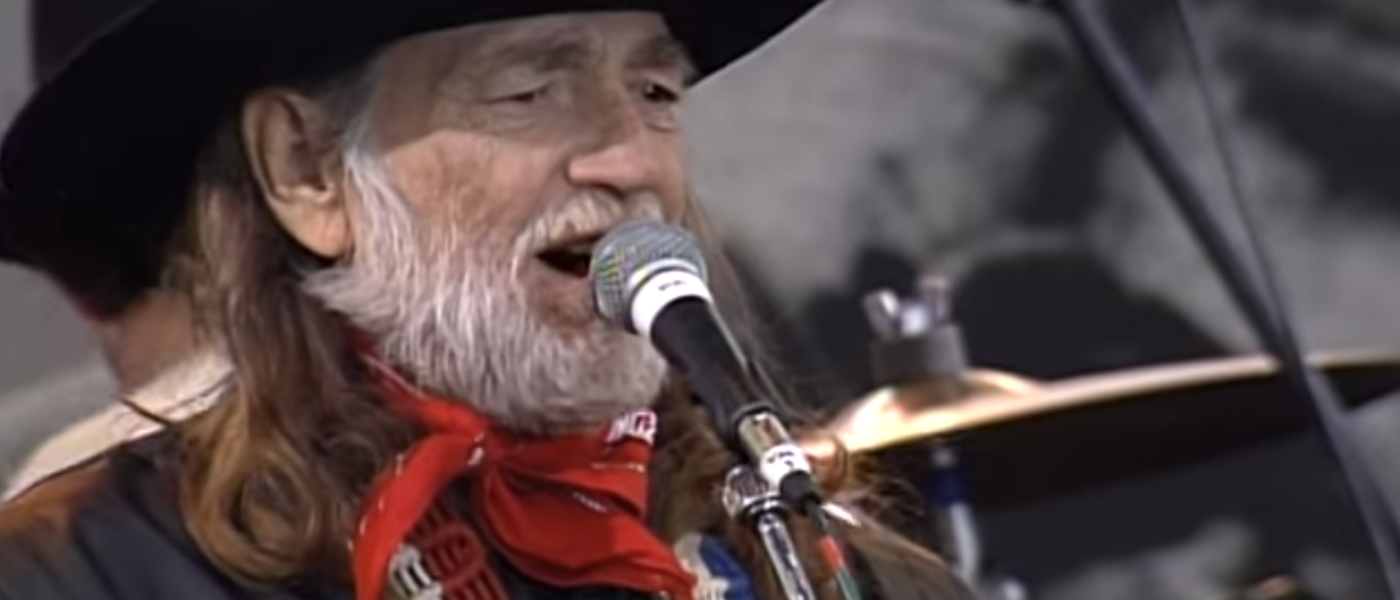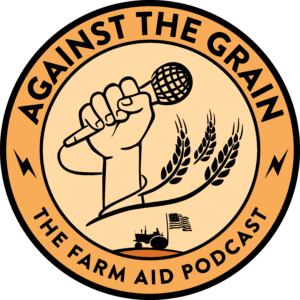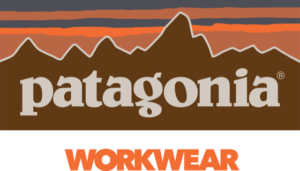Listen to episode one below, and make sure to subscribe in your podcast app of choice!
Margo Price
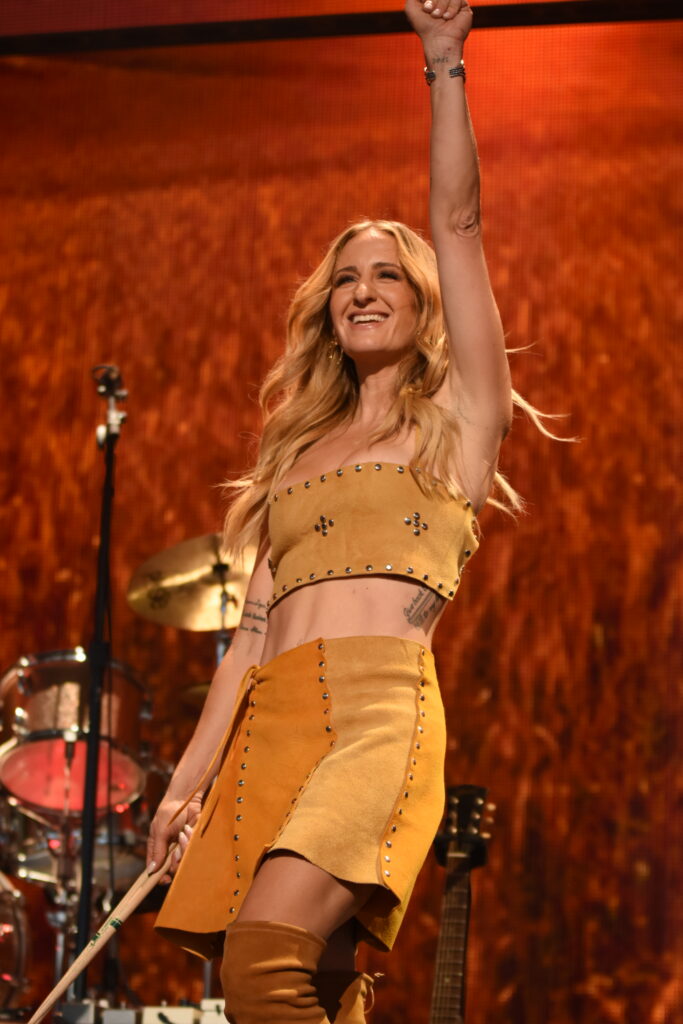
Margo Price at Farm Aid 2023. Photo © Brian Bruner / Bruner Photo
Carolyn Mugar
Farm Aid’s executive director Carolyn Mugar has an extensive resume of socially-conscious experience. The social issues she’s tackled include labor, environment, toxics, literacy and community empowerment. Prior to her work with Farm Aid, Carolyn was a union organizer with the Oil, Chemical and Atomic Workers International Union and the Amalgamated Clothing and Textile Workers International Union. In 1985, Willie Nelson asked her to help determine how the funds raised from the first Farm Aid concert should be distributed. Carolyn traveled across the countryside to visit the families who were being pushed off their land. She says she had always wondered what held the two coasts together, and that she learned a bit about that while visiting farm families at their kitchen tables.
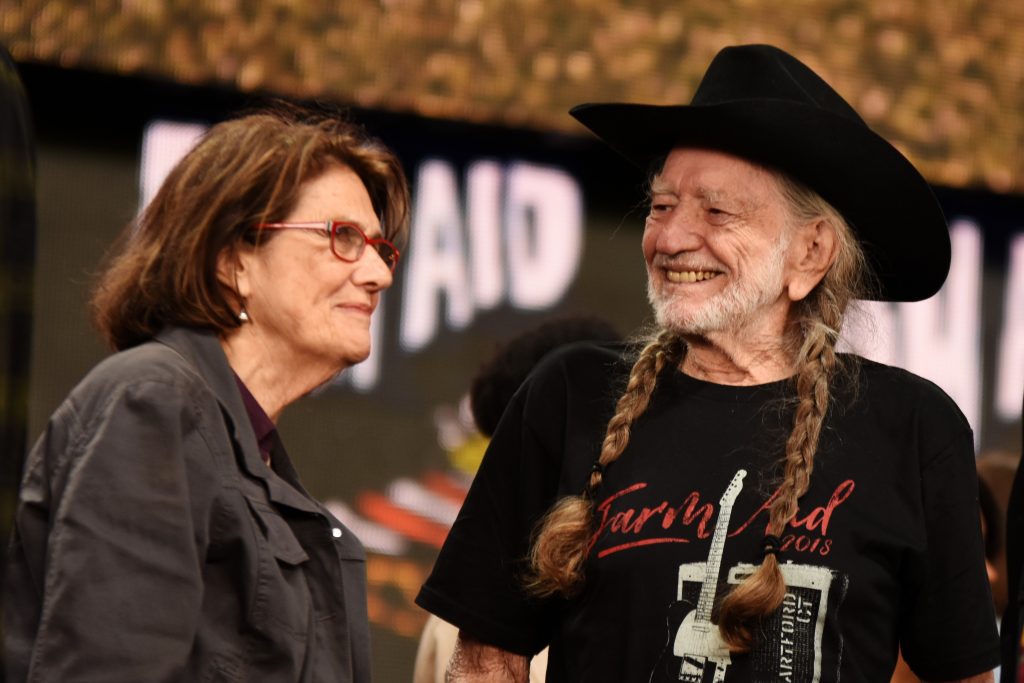
Carolyn Mugar and Willie Nelson on the Farm Aid 2018 Press Event stage. Photo: Brian Bruner
David Senter
David Senter grew up as a fourth generation farmer in Burleson, Texas. In 1977, he got involved in the early organizing of the American Agriculture Movement, leading a convoy of tractors to the state capitol in Austin. In late January, 1979, David led a tractorcade from Texas on the southern route to Washington DC. When they got there on February 5, 1979, over 5,000 tractors brought the nation’s capitol to a halt. On the morning of February 5, 1979, over 5,000 tractors brought Washington D.C. to a halt. The farmers asked Congress and the USDA for “parity,” meaning a price for their crops that matches the cost of production. For seven weeks, farmers and their tractors stayed in D.C., visiting congressional offices and the USDA, demonstrating, and making their case to the government, press and American public. The work of these 5,000-plus farmers—organizing the grassroots and applying political pressure to demand policy change—became the base upon which the farm movement of today stands. Eventually, David accepted AAM’s first paid position, working out of an office in Washington. In 1985, when Willie Nelson started thinking about holding a benefit concert for farmers, David was one of the first people he called. Today, David is Farm Aid’s historian and a valued advisor. He has attended every Farm Aid concert in the last 38 years.
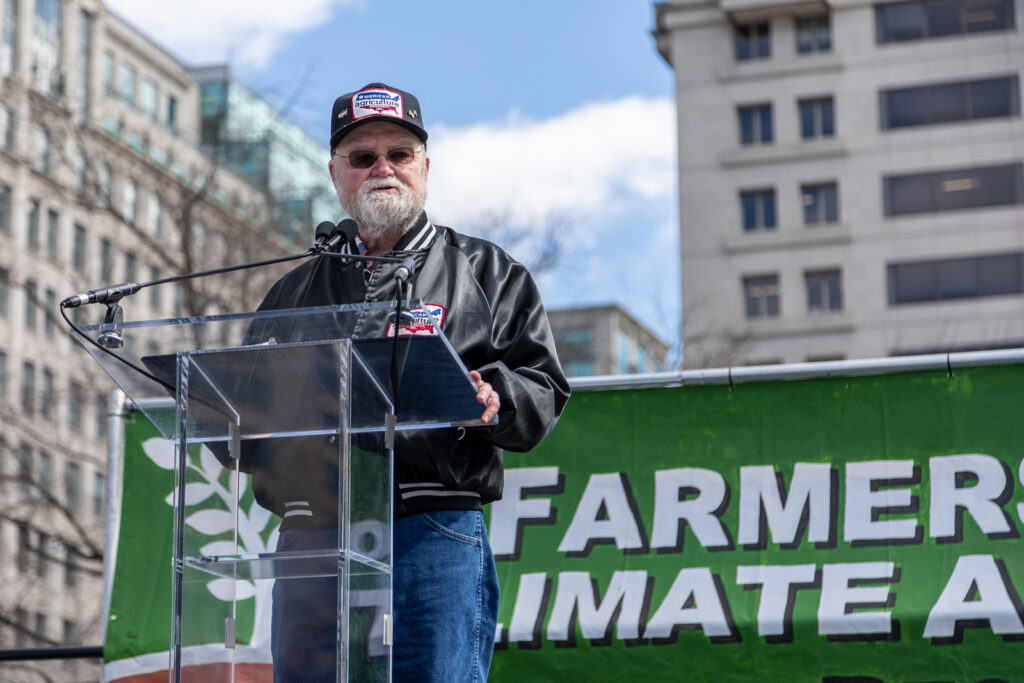
David Senter, founder of the American Agriculture Movement that mobilized tractorcades in Washington in the 1970s, speaks at Rally for Resilience: Farmers for Climate Action (Photo © Lise Metzger)
Watch Archival Videos From this Episode
Bob Dylan talking about Farm Aid at the Live Aid Concert in Philadelphia, PA, July 13, 1985 at JFK Stadium.
Against the Grain: There’s Something About Music
JOHN MELLENCAMP live music from Farm Aid 2016
MICHAEL FOLEY: Wow! That was board member John Mellencamp at Farm Aid 2016 in Bristow, Virginia, rocking on the Farm Aid stage. Earlier that day he was on that same stage talking with farmers and other artists at our press conference.
JOHN MELLENCAMP: It always hits me sideways when I say, “Gonna go do Farm Aid.” And they say ‘You guys still doing that?’ and I think, ‘You still eating?'”
MICHAEL FOLEY: This is a question that comes up from time to time.
JESSICA KURN: Well it makes sense…I don’t think anyone thought we’d still be speaking out for farmers and holding an annual festival 38 years later. And, as Willie says, we’ll be here as long as farmers need us to be. So we’re still here!
MICHAEL FOLEY: And now we’re launching a podcast!
JESSICA KURN: This is Against the Grain: A Farm Aid podcast that aims to bring the magic of our annual festival to you year-round. I’m Jessica Ilyse Kurn.
MICHAEL FOLEY: And I’m Michael Stewart Foley. We feel beyond lucky to have amazing farmers, activists, politicians and of course artists in our orbit…
JESSICA KURN: And each one of them has a unique story to tell. So help us support farmers by listening and learning more about the hard-working people who bring us our food!
MICHAEL FOLEY: On this first episode we’re exploring Farm Aid’s origins and why artists originally–and continually– sign up for this gig.
JESSICA KURN: Yes, it’s definitely unusual…they travel to a different location each year and donate their time and talent. All to support family farmers.
In preparing for this year’s festival, Michael and I started wondering what it is about music that makes it a good vehicle for social change – or is it even a good vehicle for social change?
MICHAEL FOLEY: And of course, we also want to answer that question John Mellencamp brought up: Why are we still doing this? So, stick around and find out.
MARGO PRICE: Hi Jessica it’s Margo, nice to meet you. Thank y’all for having me.
JESSICA KURN: That’s Margo Price, our newest Farm Aid board artist. She joined Willie Nelson, Neil Young, John Mellencamp and Dave Matthews in 2021. We interviewed her right before our 2023 festival back in September. I’m curious, do you think of yourself as a political artist?
MARGO PRICE: I think of myself as an artist, and also as a cultural worker. I think the songwriting is so much a part of my soul, sometimes it’s a lot of emotions, and therefore it becomes political – because everything is political, whether we want it to be or not.
MICHAEL FOLEY: I was thinking about that because i didn’t know until i read your memoir that a lot of the early writing that you and jeremy did was politically engaged–that it was happening around the start of the iraq and afghan wars–and i’m just wondering about like where that sensibility comes from? Is there something in your upbringing that made you think about wanting to engage in those kinds of issues as a songwriter and performing? Or is it something more immediate in response to the circumstances of the moment?
MARGO PRICE: Well, I think Ever since I was young, my wheels were always turning and wondering why things were the way they were. And I always kind of had a rebellious streak in me, but I would say being turned on to Joan Baez, Bob Dylan, and watching Woody Guthrie – how a song had a unique ability to get to the core of somebody where a conversation, you know, that can’t always be done. I think through books, literature, film, music – because it’s such a unique way to convey the emotions that we have and to convey the human experience, everything around us. I think that I was very drawn to that. Joan Baez got a lot of slack for what she did, and marching with MLK. But looking back on it, everybody else should have been doing it as well.
As I’ve forged my career, As I’ve used my platform as I have, it’s come with some repercussions and I’m sure to some people, I’m a really controversial character, but I’m always just trying to lead with my heart and just make people come together.
MICHAEL FOLEY: Margo isn’t the only artist who uses her platform to inspire change. In fact, the idea for Farm Aid came about at Live Aid in 1985.
JESSICA KURN: To jog your memory, Live Aid was a huge world-wide, two-venue, benefit concert held on July 13th 1985 in London and Philadelphia, to raise money for Ethiopian famine relief. On the various stages were artists like: Queen, Joan Baez, Run-DMC, Patti LaBelle, David Bowie, and Bob Dylan.
MICHAEL FOLEY: Dylan became the magical catalyst for farm aid. He got up on stage and made a seemingly off-the-cuff remark to help American farmers who were in the midst of a devastating Farm Crisis.
BOB DYLAN: “While I’m here, i’d just like to say I hope that some of the money that’s raised for the people in Africa – maybe they could just take a little bit of it (maybe one or two million, maybe) and use it, say, to pay the mortgages on some of the farms that the farmers here owe to the banks”
MICHAEL FOLEY: What Dylan’s referring to is the Farm Crisis of the 1980’s. This was a time when commodity prices in the U.S. had fallen sharply, and farmers were deep in debt. We will get into this in greater detail in future episodes, but for now, let’s just say that Bob Dylan knew what he was talking about. Record numbers of farms were being foreclosed upon all over the United States.
JESSICA KURN: That was a devastating time for farmers and really all rural people. The fabric of their communities was unraveling. One of Farm Aid’s longtime friends is David Senter. He is both a farmer and a founder of the American Agriculture Movement. We asked him to paint us a picture of what those times were like in the 80s.
DAVID SENTER: “Before 1985 the landscape was a continuing deterioration of the rural economy, of the family producers across the country. And so it was a downward spiral beginning in the early 1980s and it began to peak in 85…
JESSICA KURN: What was your experience like as a farmer? You grew up on a farm and then decided to keep it going?
DAVID SENTER: I grew up on a 4th generation farm and when I graduated from high school I rented a 1000 acre farm that adjoined my dad’s. I thought that’s all I’d ever do and eventually, urban sprawl pushed us off the family farm but i decided when that happened i was going to do everything i could to support family farmers so that we could continue to have them producing our food and fiber across this country. And so I had a farm sale in 1980 and so that was the end of our farming history from four generations.
JESSICA KURN: I think a lot of people who are not in our orbit hear the term “farm crisis” and it’s a little nebulous. As someone who was on the ground and saw farmers going through it can you explain what the farm crisis was and what it looked like?
DAVID SENTER: The Farm Crisis it was a terrible expanding tragedy for rural America. We lost 50% of the total family farmers during the crisis of the mid 80s. 50% of the family producers across the country. 365 farmers per day were going out of business during 85. And so we brought a couple thousand farmers to Washington in 1985 – March of ‘85 – for what we called a parity march. And we had a rally on the steps of the Jefferson. And we had 365 white crosses, with somebody that had committed suicide or been foreclosed on’s names on those crosses and we drove them on the Mall and made a graveyard in front of USDA. And we got tremendous exposure to that.
MICHAEL FOLEY: That summer, Willie also heard about Bob Dylan’s statement from the Live Aid stage, but it wasn’t the first time he had thought about what was going on in farm country.
DAVID SENTER: Willie, during the meantime was doing state fairs, traveling across the country. And he was meeting with farmers and he was seeing these foreclosure signs and all across rural America. He knew there was a big problem. Because the farmers that were losing their land were also losing their homes, which led to a collapse of rural communities of local businesses, schools, it was just a really bad deal.
MICHAEL FOLEY: And then one day in August of 1985 David got a surprise call from Willie Nelson.
DAVID SENTER: And he told me, “I was talking to Bob Dylan.” And he said “Dylan told me: ‘how are we going to feed Africa, the world, and ourselves, if we’re putting all our own family farmers out of business?’” So , Willie said, “I’m thinking about having a concert for farmers, what do you think?”
JESSICA KURN: That conversation, of course, led to the first Farm Aid concert being held in Champaign, Illinois, on September 22, 1985.
MICHAEL FOLEY: Right, and, at the time, Willie and Neil Young, and John Mellencamp – the three original founding artists of Farm Aid – thought that this would be a one-off concert (like Live Aid) that would raise enough money to help farmers weather the farm crisis.
JESSICA KURN: And they did raise about $7 million dollars at that first Farm Aid, but it obviously wasn’t enough.
MICHAEL FOLEY: In future episodes, we’ll get into the 1980s farm crisis in more depth, and we’ll discuss why it started and some of the ways that Farm Aid, led by Willie Nelson, and working alongside many farm groups, managed to get Congress to pass legislation that provided some relief by the early 1990s
JESSICA KURN: For now, we want to let David Senter tell the story of how Willie Nelson and Bob Dylan continued to collaborate on behalf of family farmers in the years following that first Farm Aid concert. They were using their voices, and song-writing prowess to convey a powerful message to the American people.
DAVID SENTER: I was sitting at home one night, we had friends over, and the phone rang. And Willie said, ‘I’m in a hotel room in New York City, with Bob Dylan, and we’re writing a farm song. And so, he’s helping with the music, and I’m writing the lyrics – “Heartland” is what they were working on – and so, there was no speaker phone. They laid the receiver down on the coffee table or wherever, and then they’d be playing and singing and he’d pick it up and say, “what do you think?” I said “it’s great! I love it!” So he’d ask about, read the next verse, and so we went through it, and I said “it needs to be on your next album, and of course, he sang it at the next Farm Aid and it was on an album that came out. And it was on the next album. And I sit back and think about how amazing it was to be on the phone with those two artists listening to the development of a song. [end 27.28]
MICHAEL FOLEY: Here’s Willie playing that song, called “Heartland” at the Sixth Farm Aid concert, this one in Ames, Iowa, in April 1993.
WILLIE NELSON SINGING:
There’s a home place under fire tonight in the heartland; And the bankers are taking my home and my land away;
There’s a big aching hole in my chest now where my heart was;
And a hole in the sky where God used to be;
My American dream fell apart at the seams;
You tell me what it means, you tell me what it means
WILLIE NELSON: And again welcome to Farm Aid 6 in Ames, Iowa. we’re here again, they didn’t get rid of us, we’re here one more time to tell you about the problems with the small family farmer. We used to have 8 million small family farmers on the farm, now we’re down to less than 500,000, losing one every 15 mins. That’s our problem. Now here’s our solution: We put those 7 million farmers back on the farm starting tomorrow. Stop all of the foreclosures, get all the farmers back on the farm and automatically you’ll sell 7 million new tractors, 7 million new voters on the land, 7 million new pickups, 7 million new taxpayers. It makes sense to me, does it make sense to you?
MICHAEL FOLEY: Stick around.
JESSICA KURN: Welcome back. By the time Willie and Bob Dylan wrote “Heartland,” it had become clear that Farm Aid was moving toward becoming an annual event. It needed a staff and office to not only organize the concerts, but to field calls from farmers, and to coordinate with other farm groups.
MICHAEL FOLEY: Here’s David Senter again, telling the story of how he learned from Willie about Farm Aid’s new office
DAVID SENTER: “Willie called me and said, ‘Dave, we’re opening a Farm Aid office in Cambridge.” And I said “Cambridge? Where the hell is Cambridge, Texas?” Willie said “no, no, no. He said “Like in Boston, like at Harvard, like in Massachusetts!” And I said, “what in the hell do we want with an office in Massachusetts for?” And he said, “wait until you meet Carolyn Mugar.”
JESSICA KURN: You may not know Carolyn Mugar’s name as well as you know Willie Nelson’s, but Carolyn – who has been Farm Aid’s executive director since the very beginning in 1985 – is a legend in organizing and activist circles.
MICHAEL FOLEY: Carolyn was introduced to Willie by their mutual friend, the Texas writer Bill Witliff, and since she came from the Boston area, that’s where the office was established (and where it still is today).
JESSICA KURN: We got to interview Carolyn and David Senter together recently, and we asked how Carolyn got involved in the farm movement.
MICHAEL FOLEY: By that time, in 1985, Carolyn had extensive activist experience, but what I did not know until we spoke with her, is that she had become increasingly focused on rural America and who owns the land.
CAROLYN MUGAR: And I found this gradual deterioration in the towns, as you talked about, and people talking about it – and that was the activism. That was what the activism was around. I mean there was really a buzz on the ground – and people were coming together, finding ways to support each other, and just found the most amazing, innovative solutions to helping each other.
JESSICA KURN: But that kind of grassroots activism was not the same as joining forces with a bunch of famous musicians to bring attention and raise money for the cause. So we asked DAvid and Carolyn about that.
DAVID SENTER: Music is something that brings people together, and music brings people together who probably didn’t care or know anything about what was going on.
CAROLYN MUGAR: And you know, I think It opens you up. When you’re at music and you share it with the people in your little neighborhood, so to speak, you end up being just more open, open-hearted, and you open, as David says, you open up and then you hear what’s happening – you can take it in. Also, what I love about what music did was what Willie said, and everybody else, “I’m not an elected official. I’m just going to do what I do, and I’m just going to give what I can give.” Those – all those musicians – just said we’ll give what we can give. I think it’s what we’re asking of everybody – what we’re inviting. We don’t ask. Farm Aid invites people. And we just invite people to feel that they want to be a part of something and that they want to give whatever they can give and it’s not by any means always money.
They’d ask Willie, “how much do you want to raise?” and he’d say “we want to raise awareness and as much as we can.”
MICHAEL FOLEY: We know from this year’s Farm Aid festival that that is a model that continues to work.
JESSICA KURN: That’s right. We recently sent out a survey to Farm Aid 2023 ticket buyers and the responses were encouraging!
MICHAEL FOLEY: Here’s a good one. One person wrote: “[This was all] new to us. I now plan to visit more farmers markets and purchase direct from the farms where possible.”
JESSICA KURN: Oh I like that. I found this gem. The person said: “This was our first Farm Aid and we found it so moving to interact with many like minded souls who care so deeply for our planet and our future. I left feeling empowered and invigorated!!”
MICHAEL FOLEY: I’ll share one more: “Being from the city, we are not aware of a lot of issues farmers face. I think the most important lesson I brought home was to speak the message to others and to connect the choices we make about our food and where it comes from to the climate.”
JESSICA KURN: So, I think it’s pretty clear that music works as a way to educate the public and garner support for family farmers. Margo Price gave a really great metaphor for this…
MARGO PRICE: It’s like the Mary Poppins effect. Where it’s like: You’re talking about very difficult things, and the music is the saccharine that helps it go down and make it feel like a celebration.
MICHAEL FOLEY: But not all musicians are interested in getting political in a public way.
MARGO PRICE: Some people just want to make the money, not say anything, play neutral all the time. That is what it is. But I think many artists, many songwriters, we’re just too much emotional empaths, you see somebody struggling, you see something going on, whether you write it in the songs, or you’re just doing the work by supporting causes, charities, and speaking up for things – I think that they’re the same.
I keep going back to Bob Dylan. We wouldn’t even have Farm Aid if it wasn’t for Bob Dylan, his brainchild. He gave so many songs to the movement that people are still singing today.
JESSICA KURN: I really like that, the way that Margo talks about her work as a cultural worker, as working within an artistic tradition that is alive and well to this day.
MICHAEL FOLEY: Yeah, and as if to drive that point home, look who showed up at Farm Aid 2023 in Indiana this year – none other than Bob Dylan himself, playing with members of The Heartbreakers (now known as The Dirty Knobs), just as he did in 1985 and 1986. It was pretty incredible
BOB DYLAN, Maggie’s Farm live at Farm Aid 2023
JESSICA KURN: That seems like a good place to leave it for our first episode of Against the Grain
MICHAEL FOLEY: We’ll be revisiting this topic of artists and activism again in future episodes, but we have a lot more planned, too.
JESSICA KURN: Coming up in the next few episodes, we’ll talk to farmers and artists, advocates and organizers, about corporate dominance of our food system. About racial discrimination and Black land loss. About climate change, farmers’ mental health, and about growing the good food movement.
DAVE MATTHEWS: The mistreatment of farmers that this country allows, and almost endorses, on a political level, is shameful. We need to do all we can to turn that around, not only for family farmers but for all of us and the health of the planet.
MICHAEL FOLEY: That was Farm Aid Board Artist Dave Matthews talking to us backstage at our most recent festival. You’ll want to hear the rest of his interview! So be sure to subscribe and follow “Against the Grain: the Farm Aid Podcast” for more content like this, coming this fall wherever you listened to this episode!
JESSICA KURN: Against the Grain was written and produced by us and our theme music was composed and performed by Micah Nelson.
MICHAEL FOLEY: Thanks to David Senter, Carolyn Mugar and Margo Price for joining us on this first episode.
JESSICA KURN: To learn more about the content in this episode, watch archival videos of Willie Nelson, John Mellencamp and Bob Dylan and to read the transcript of this episode visit www.farmaid.org/podcast
Special thanks to our founding partner, Patagonia Workwear.
Learn more about Against the Grain